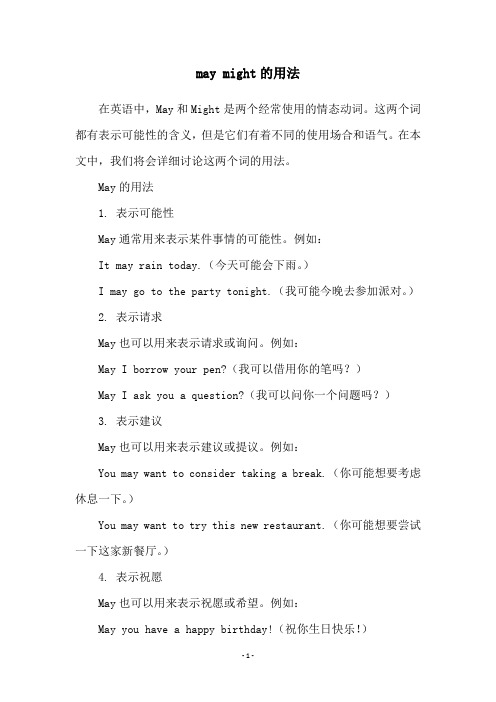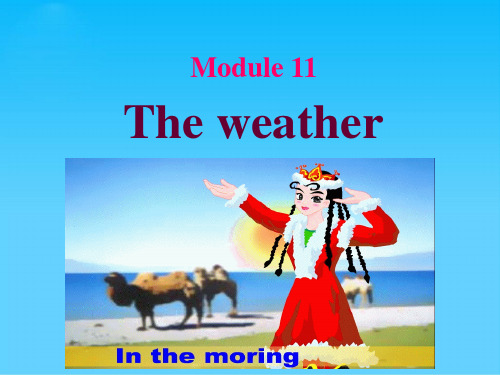情态动词 may,might 表示“可能”
may might的用法

may might的用法在英语中,May和Might是两个经常使用的情态动词。
这两个词都有表示可能性的含义,但是它们有着不同的使用场合和语气。
在本文中,我们将会详细讨论这两个词的用法。
May的用法1. 表示可能性May通常用来表示某件事情的可能性。
例如:It may rain today.(今天可能会下雨。
)I may go to the party tonight.(我可能今晚去参加派对。
)2. 表示请求May也可以用来表示请求或询问。
例如:May I borrow your pen?(我可以借用你的笔吗?)May I ask you a question?(我可以问你一个问题吗?)3. 表示建议May也可以用来表示建议或提议。
例如:You may want to consider taking a break.(你可能想要考虑休息一下。
)You may want to try this new restaurant.(你可能想要尝试一下这家新餐厅。
)4. 表示祝愿May也可以用来表示祝愿或希望。
例如:May you have a happy birthday!(祝你生日快乐!)May your dreams come true!(愿你的梦想成真!)Might的用法1. 表示可能性Might也用来表示可能性,但是它的语气比May更加含糊。
例如: It might rain today.(今天可能会下雨。
)I might go to the party tonight.(我可能今晚去参加派对。
)2. 表示可能性的否定Might也可以用来表示否定的可能性。
例如:He might not come to the meeting.(他可能不会来参加会议。
) They might not be able to finish the project on time.(他们可能无法按时完成这个项目。
)3. 表示委婉的请求或建议Might也可以用来表示委婉的请求或建议。
may和might作情态动词的用法

may和might作情态动词的用法May和might作为情态动词有以下几种用法:1. 表示许可或请求:may或might用于表示向对方提出请求或询问是否有许可。
例如:- May I borrow your pen, please?(我可以借用你的钢笔吗?)- Might I ask you a question?(我可以问你个问题吗?)2. 表示可能性:may或might用于表示某事发生的可能性。
例如:- It may rain later.(可能会下雨)- He might be late for the meeting.(他可能会迟到会议)3. 表示建议或意见:may用于表示建议或给出主观意见。
例如:- You may want to double-check your work before submitting it.(在提交之前,你可能需要再检查一下你的工作。
)4. 表示推测或假设:may或might用于表示推测或假设。
通常用于以"可能"的形式表示对过去或现在的不确定性。
例如:- He may/might have forgotten the meeting time.(他可能忘记了会议时间。
)- She may/might be studying in her room now.(她可能现在正在她的房间里学习。
)需要注意的是,may和might在表达可能性和推测时的区别非常细微,但might在口语中更常用于推测和假设。
另外,may 和might在否定句和疑问句中使用时没有区别,例如:- You may not bring your own food into the theater.(你不能把自己的食物带进剧院。
)- May/Might I come in?(我可以进来吗?)。
情态动词must, can, could, may, might表推测的用法

情态动词must, can, could, may, might表推测的用法:情态动词中的must, can, could, may, might都表推测。
其中must的可能性最大,can / could次之,may / might最小。
具体用法如下:1. must的用法(1)表示推测“可能性”时,意思是“一定、准是”,语气较肯定,较有把握。
He must be American. = It is certain that he is American. 他准是个美国人。
(2)must表推测只能用于肯定句。
如果要表示“一定不、肯定不”的意思时,应用can`t,如询问某种可能时,应用can。
He must know my address. 他肯定知道我的地址。
(一定)He can`t know my address. 他肯定不知道我的地址。
(一定不)Can he know my address? 他知道我的地址吗?(询问可能性)(3)must表示推测时,可以推测现在/正在发生的动作/过去发生的动作。
He must have a car now. (现在)他一定有辆小汽车。
He must be doing his exercises in the classroom.(正在进行)他一定在教室里做练习。
He must have finished the work.(过去发生)他一定已完成了工作。
注:must表示推测时很少用于将来的情况。
一般不用He must come tomorrow.可用It`s certain / I`m sure that he will come tomorrow. (4)在反意疑问句中,当附属部分含有表示推测意义的must时,疑问部分的助动词应与must后面的动词在非推测情况下的用法保持一致。
He must be a worker, isn`t he? (现在)他准时个工人,是吗?It must have rained last night, didn`t it? (过去)昨晚一定下雨了,是不是?You must have learned English for many years, haven`t you? (完成时)你一定学了好多年英语,是吗?2. can / could的用法(1)can表示推测“可能性”时,往往用于否定句或疑问句。
【教育资料】常用情态动词 must,may,might表示推测语气学习专用

常用情态动词must/may/might表示推测语气(1)may/might表示可能性,可解释为“或许”、“可能”。
比如:It may rain this afternoon.今天下午可能下雨。
It may be to sell a film.或许是营销一部影片。
The coat is too close to the fire. It might get burnt.这件上衣离火炉太近,可能会烤焦。
(2)must表示“一定,必定”,用于肯定结构。
比如:This must be the book you want.这一定是你要的那本书。
This must be the movie you want to watch.这一定是你想要看的电影。
They young man look s like Jimmy. He must be Jimmy’s brother.那个年轻人看上去像杰米。
他一定是杰米的兄弟。
一、选择填空。
9. A high school is a place where students ___ team up for all kinds of things: sports, class projects and trips.A. canB. shallC. oughtD. need10. The murderer has been on the run for over a month.The police ___ catch him before he does something worse.A. wouldB. had betterC. couldD. had to参考答案:9-10: AB二、分析句子的语法结构,并译成中文。
Donald Trump has said he will “certainly” ask Vladimir Putin about extraditing 12 Russians indicted over the theft of data from Democratic party bodies ahead of the 2019 election. The US president will meet his Russian counterpart in Helsinki on Monday.【The Guardi。
情态动词maymight

It is possible to do sth. 主语 + will probably / possibly + v. 如:
It is possible that it’ll be snowy. 有可能要下雪。 probably表示“很可能”,它所表示的
可 能性比possibly(可能)要大。
an old man.
4. It was late, _s_o_ we had to go to school by taxi.
5. She _m_a_y_ be our English teacher. Let’s say “Hello” to her.
6. It’s _p_o_s_s_ib_l_e for us to finish the work before 6 o’clock.
4. My for; to
B.
It is possible that…
father
gave
me
a
dictionary
as
my
Henry’s dream.
birthday present. What’s
like
That was a
_____________________
My father ___ autumn.
might与may没有很大区别,但表示一般 将来时的可能性时,might的可能性比 may的可能性要小。如:
Bring your swimsuit because you might
want to swim in the sea. 带上游泳衣,说不定你要到海里去游泳 呢。
表示可能的方式有很多,除使用情态动 词may/might以外,还可以使用表示可 能的形容词和副词,常用的有:
may,might,could表可能性用法

May, might, can, could 表可能性1)may/might 表示‘可能’,往往可以交替使用,并无时间上的差异,只是用might 在口气上比用may 更加不甚肯定,从而比较婉转。
may/might 既可表示现在的‘可能’:. It may/might be true.He may/might be still waiting at the door.可能’ 也可表将来的‘ :. He may/might leave tomorrow.He may/might not to leave next week.,须用can 而不用may可能’ 在疑问句中表示‘ . Where can he beHe may be in the office.2)用can /could 表示现在的‘可能’,在口气上could 比较婉转。
. That’s not mine. Whose can it beIt could be John's. 用can ,表示‘可能’,较多的用于否定句中,而could 则不受此限。
. If you don’t have a guide, you could lose your way.(=it’s possible for you to lose your way.)It can’t/couldn’t be true.The moon cannot always be at the full.can 与may 的区别在否定句中,用can 表示‘可能’与用may 表示‘可能’往往产生含义上的微妙差异:用can 表示‘可能’往往表示逻辑上的‘可能性’;而用may 表示‘可能’则指事实上的‘可能性。
. The road can be blocked.(=It’s possible for the road to be blocked.)The road may be blocked.(=It’s possible that the road is blocked.)Another example:Mr. Reed is in poor health. He can be ill at any time.Mr. Reed looks pale. He may be ill.3)表示过去的‘可能’,可用‘may/might+ 不定式完成体或不定式完成进行体’ ,在这里用may/might ,也只有口气上婉转程度的差异,而没有时间上的区别:. He may/might have been hurt.She may/might have missed the train.也用‘can/could+ 不定式完成体’ 表示过去的‘可能’. He can’t/couldn’t have been hurt.She can’t/couldn’t have missed the train.用‘might/could+ 不定式完成体’ 有时可以表示本来可能发生但没有发生的,或者本来可能完成却没有完成的动作。
May,might, could表可能性用法
May, might, can, could 表可能性1)may/might 表示‘可能’,往往可以交替使用,并无时间上的差异,只是用might 在口气上比用may 更加不甚肯定,从而比较婉转。
may/might 既可表示现在的‘可能’:e.g. It may/might be true.He may/might be still waiting at the door.也可表将来的‘ 可能’ :e.g. He may/might leave tomorrow.He may/might not to leave next week.He may be in the office.2)用can /could 表示现在的‘可能’,在口气上could 比较婉转。
e.g. That’s not mine. Whose can it be ?It could be John's. 用can ,表示‘可能’,较多的用于否定句中,而could 则不受此限。
e.g. If you don’t have a guide, you could lose your way.(=it’s possible for you to lose your way.)It can’t/couldn’t be true.The moon cannot always be at the full.can 与may 的区别(=It’s possible for the road to be blocked.)The road may be blocked.(=It’s possible that the road is blocked.)Another example:Mr. Reed is in poor health. He can be ill at any time.Mr. Reed looks pale. He may be ill.She may/might have missed the train.She can’t/couldn’t have missed the train.用‘might/could+ 不定式完成体’ 有时可以表示本来可能发生但没有发生的,或者本来可能完成却没有完成的动作。
情态动词may和might的推测用法
情态动词may和might的推测用法一、基本用法说明may和might均可表示推测,两者没有时态上的区别,只是用might比用may语气更不确定,表示的可能性更小。
从句型使用方面看,may和might均可用于肯定句和否定句,但用于疑问句时,may通常不用于句首,但可用于疑问句的句中(如特殊疑问句等),而might尽管可以用于疑问句的句首,但不算普通,通常会改用其他句式(如用could等)。
二、对现在或将来的推测当may和might表示对现在或将来情况作推测时,其后接动词原形。
如:She may [might] know his address. 她可能知道他的地址。
What may [might] be the result of the new tax? 征收新税可能产生什么结果?有时也可后接动词的进行式,表示动作正在进行。
如:She may [might] be waiting for you. 她可能在等你。
He may [might] be writing a letter. 他可能在写信。
正如有时可以用进行时态表示将来意义一样,may / might后接动词的进行式有时也可表示将来意义。
如:We may be buying a new house. 我们可能要买一座新房子。
If I hear from Tim I may be leaving tonight. 如果我从蒂姆那儿得到消息,我可能今晚就离去。
三、对过去的推测表示对已经发生的情况进行推测,用may和might都可以,但其后必须接动词的完成式,即用于“may / might+have+过去分词”这样的形式。
如:She may have missed her train. 她可能误火车了。
Mathews may have written that letter. 这封信可能是麦修斯写的。
“might+动词完成式”除表示对已发生情况的推测外,还有以下用法(此时均不能用ma y):1. 表示未曾实现的可能性:即过去本来可能发生而实际上没有发生的情况,通常译为“本来可以”“本来可能”等。
情态动词用法详解:表达能力、可能性、请求、义务和意愿
情态动词用法详解:表达能力、可能性、请求、义务和意愿情态动词在英语语法中的用法主要有以下几个方面:1.表示能力:情态动词 can, could, be able to 等用于表示能力,表示具备做某事的能力或可能性。
例如,“I can swim”,“He will be able to walk soon”。
2.表示可能性:情态动词may, might, could 等用于表示可能性,表示某件事情有可能发生或存在。
例如,“She may be late”,“It might rain tomorrow”。
3.表示请求和委婉语气:情态动词 can, could, may, might 等用于表示请求和委婉语气,表示请求对方做某件事情的意愿或可能性。
例如,“Can you help me with this task?”,“Would you mind closing the window?”。
4.表示义务和必要:情态动词 must, have to, should 等用于表示义务和必要,表示必须或应当做某事。
例如,“You must complete your homework”,“You have to attend the meeting”。
5.表示意愿和目的:情态动词 will, would, shall 等用于表示意愿和目的,表示个人意愿或目的。
例如,“I will do my best to achieve my goal”,“He would like to go shopping”。
这些用法概括了情态动词在英语语法中的主要用法,通过了解和掌握这些用法,可以帮助我们更好地理解和使用情态动词,从而提高我们的英语表达能力。
情态动词must。can。could。may。might表推测的用法
情态动词must。
can。
could。
may。
might表推测的用法情态动词can / could表示推测时,意思是“可能、有可能”,语气比must弱。
XXX用于现在和将来,could用于过去。
1)表示可能性时,can / could后面接动词原形。
He canbe American。
= It is possible that he is American.他可能是个美国人。
2)表示不可能性时,用XXX。
He can`t be American。
=It is impossible that he is American.他不可能是个美国人。
3)can / could还可以表示“会、能够”的意思。
He can speak Chinese.他会说中文。
4)在疑问句中,XXX表示请求、允许、建议等意义。
Can you help me?你能帮我吗?Could you please pass me the salt?你能把盐递给我吗?3.may / might的用法1)may / might表示推测时,意思是“可能性很小”,语气比can / could更弱。
He may be American。
= It is possible thathe is American。
but the possibility is small.他可能是个美国人,但可能性很小。
2)may / might还可以表示请求、许可、建议等意义。
May I use your phone?我可以用你的电话吗?Might I suggest a different approach?我可以建议一种不同的方法吗?3)在虚拟语气中,XXX表示“可能性很小,甚至不可能”,表示一种假设的情况。
If I had studied harder。
I might have passed the exam.如果我学得更努力,我可能会通过考试。
总之,情态动词must。
- 1、下载文档前请自行甄别文档内容的完整性,平台不提供额外的编辑、内容补充、找答案等附加服务。
- 2、"仅部分预览"的文档,不可在线预览部分如存在完整性等问题,可反馈申请退款(可完整预览的文档不适用该条件!)。
- 3、如文档侵犯您的权益,请联系客服反馈,我们会尽快为您处理(人工客服工作时间:9:00-18:30)。
情态动词may/might表示“可能”
情态动词本身有一定的含义,为谓语动词增添情态色彩,表示说话人对有关行为或事物的态度和看法,认为其可能、应该或必要等。
我们学过的can 和may 都属于这类词。
情态动词无人称和数的变化,后面接的动词需用原形,否定式是在情态动词后面加 not。
当我们想表达可能发生某事以及某人可能做某事时,可以用 may/might 表示。
例如:
Bring a map because you may want to travel around. 带张地图,因为
你可能想四处转转。
There may be a few showers, so bring an umbrella with you. 可能会
有阵雨,所以随身带把伞吧。
might 与 may 没有太大的区别,形式上 might 是 may 的过去式,但在表示将来的可能情况时,might 表示的可能性比may 表示的可能性还要小。
例如:
Take your swimming clothes because you might want to go swimming in the sea. 带上游泳衣吧,说不定你想到海里游泳呢。
英语中表示可能的方式有很多,除使用情态动词 may/might 以外,还可以通过 will 以及表示“可能”的形容词和副词表达,常用的有:It is possible to do sth., It is possible that ..., 主语 + will probably/possibly + v. 等。
例如:Is it possible to visit Alaska in December?12月份去阿拉斯加旅游有
可能吗?
It is possible that it will snow in the night. 夜里有可能会下雪。
It will probably be cold and wet. 天气很可能会又冷又湿。
probably 表示“很可能”,所表示的可能性比 possibly 要大。
